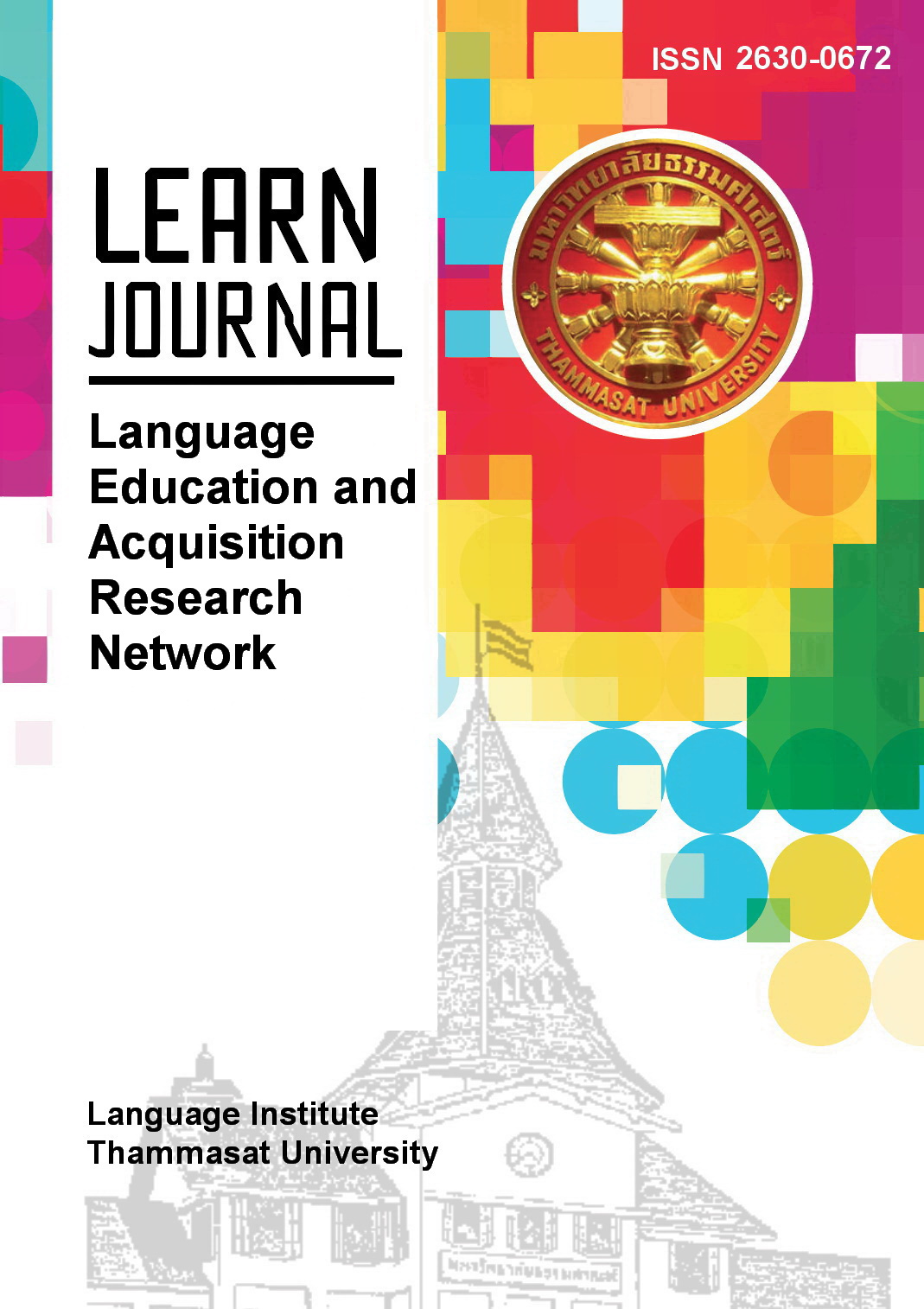EFL Tertiary Learners’ Perceptions of Self-Assessment on Writing in English
Main Article Content
Abstract
Self-assessment (SA) allows students to evaluate their language performance, as well as encourage and stimulate their language learning. However, only a few studies have been conducted on self-assessment in EFL contexts, particularly in Thailand. Among these studies, they have rarely focused on students’ perceptions and how they use self-assessment to improve their writing ability. Thus, this study explored university EFL students’ perceptions and reflections on the use of self-assessment in English writing in Thailand. A mixed-methods research design was used to explore a total of 41 students in two classes (18 and 23 students). Questionnaires, self-assessment forms, and reflective journals were used to collect data from two groups of students enrolling in writing courses at two universities. Mean, S.D., and dependent t-test were used for the analysis of quantitative data, while content analysis was used for the analysis of qualitative data. The results revealed that these students perceived self-assessment as a tool for writing development (self-monitoring), a means of improving their attitudes about writing, and a means of developing their self-confidence. The results suggest that using self-assessment can help students become independent learners and improve their performance in English writing.
Article Details
References
Andrade, H. L. (2019). A critical review of research on student self-assessment. Frontiers in Education, 4, 1-13. https://doi.org/ 10.3389/feduc.2019.00087
Bachman, L. (2000). Modern language testing at the turn of the century: Assuring that what we count, counts. Language Testing, 17(1), 1-42. https://doi.org/10.1177/026553220001700101
Belachew, M., Getinet, M., & Gashaye, A. (2015). Perception and practice of self-assessment in EFL writing classrooms. Journal of Languages and Culture, 6(1), 1-8. doi: 10.5897/JLC2013.0254
Bing, X. (2016). A study of the effects of student self-assessment on the EFL writing of Chinese college students. Journalism and Mass Communication, 6(2), 91-107. doi:10.17265/21606579/ 2016.02.005
Bowman, J. E. (2017). Engaging students in the assessment process: A quantitative study of peer- and self-assessment [Doctoral dissertation, Notre Dame of Maryland University]. ProQuest Dissertations and Theses database. https://www.proquest.com/ openview/022bfcc783d0ecc1cea68b23f3a43997/1?pq-origsite=gscholar&cbl=18750
Cheng, X., & Zhang, L. J. (2022). Teachers helping EFL students improve their writing through written feedback: The case of native and non-native English-speaking teachers’ beliefs. Frontier in Psychology, 13, 1-15. doi: 10.3389/fpsyg.2022.804313
Creswell, J. W. (2012). Educational research: Planning, conducting, and evaluating quantitative and qualitative research. (4th ed.). Pearson.
Culham, R., & Wheeler, A. (2003). 40 reproducible forms for the writing traits classroom. Scholastic.
Dhanarattigannon, J. (2010). Teaching of writing process-based approach. Humanities Journal (Thailand), 17(2), 25-40.
Dokchandra, D. (2018). The effects of process writing approach on performance of an overcrowded EFL writing class at a university in Thailand. The 1st Annual International Conference on Language and Literature, KnE Social Sciences & Humanities, 161-173. doi: 10.18502/kss.v3i4.1931
Elgadal, H. A. (2017). The effect of self-assessment on inexperienced EFL students’ writing during revision. [Unpublished dissertation]. University of Birmingham.
Herayati, D. F. (2020). Teaching writing through self-assessment and analytical scoring. International Journal of Scientific & Technology Research, 9(2), 4268-4272.
Huang, Y., & Zhang, L. J. (2020). Does a process-genre approach help improve students’ argumentative writing in English as a foreign language? Findings from an intervention study. Reading and Writing Quarterly, 36(4), 339–364. doi: 10.1080/10573569.2019.1649223
Huda, M. I. (2020). Promoting learner autonomy through self-assessment in writing class. ETERNAL (English Teaching Journal), 11(2), 36-50. https://doi.org/10.26877/eternal.v11i2.7561
Jacobs, H. L., Zinkgraf, S. A., Wormuth, D. R., Hartfiel, V. F. & Hughey, J. B. (1981). Testing ESL composition: A practical approach. Newbury House.
Ministry of Education. (2008). Basic Education Curriculum 2008. Agricultural Cooperative Assembly of Thailand. (in Thai) http://academic.obec.go.th/images/document/1525235513_d_1.pdf
Panadero, E., Brown, G. L., & Strijbos, J. W. (2016). The future of student self-assessment: A review of known unknowns and potential directions. Educational Psychology Review, 28(4), 803-830. https://doi.org/10.1007/s10648-015-9350-2
Puengpipattrakul, W. (2014). A process approach to writing to develop Thai EFL students’ socio-cognitive skills. Electronic Journal of Foreign Language Teaching, 11(2) 270-284. doi: 10.18502/kss.v3i4.1931
Ratminingsih, N. M., Marhaeni, A. A. I. N., & Vigayanti, L.P.D. (2018). Self-assessment: The effect on students’ independence and writing competence. International Journal of Instruction, 11(3), 277-290. https://doi.org/10.12973/iji.2018.11320a
Sapsirin, S. (2014). Self-assessment of business English writing ability of Thai university students: Criterion-related validity and gender differences. NIDA Journal of Language and Communication, 19(22), 77-91.
Suwanarak, K. (2018). Self-evaluation of Thai adult learners in English writing practice. The Southeast Asian Journal of English Language Studies, 24(2), 95-111. http://doi.org/10.17576/3L-2018-2402-08
Thongpai, J., & Deerajviset, P. (2017). Effects of self-assessment on writing of Thai EFL students in different groups of learning styles. In Multidisciplinary perspective of local wisdom: Past, present, and future of Asia. The 5th Asian Academic Society International Conference (pp. 173-181). Khon Kaen Univeristy. http://aasic.org/proc/aasic/article/view/289/286
Wong, K. M., & Mak, P. (2018). Self-assessment in the primary L2 writing classroom. Canadian Modern Language Review, 75(2), 1-14. doi: 10.3138/cmlr.2018-0197
Zhang, T. F. (2021). The effect of highly focused versus mid-focused written corrective feedback on EFL learners’ explicit and implicit knowledge development. System, 99, 1–14. doi: 10.1016/j.system.2021. 102493


